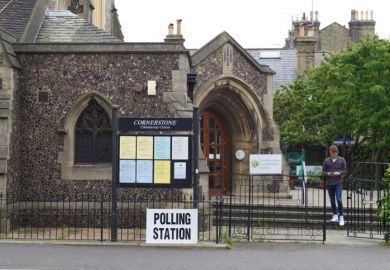The new president of the European University Association has vowed to “put a lot more pressure on Brussels” and to stand up to the European Commission on issues affecting higher education during his four-year term.
Rolf Tarrach also said that he wanted to ensure that UK universities were happy as members of the association and that he would listen to their concerns.
The Spanish physicist was elected president of the organisation at its annual conference in Antwerp on 16 April. He will succeed Maria Helena Nazaré when she steps down in July. Until December 2014, Professor Tarrach was rector of the University of Luxembourg, and he has been a EUA council member for 10 years.
Speaking to Times Higher Education at the conference at the University of Antwerp, he said that one of his priorities in the role would be to make sure that leading universities join the association and remain members. He also noted past concerns about some “good British universities” wanting to leave the EUA. Currently the EUA lists 56 UK universities as members.
Those UK institutions considering leaving the association “have been convinced to postpone their decision for the time being, but that is not enough for me. I want them to be active and I want them to be happy being a member,” he said.
“There is no European universities system without the British universities. I will listen very carefully to what they have to tell me.”
As the voice of 850 institutions and 17 million students in 47 countries, the EUA could be “very powerful”, Professor Tarrach said.
“We have to put a lot more pressure on Brussels,” he said, adding that this should mainly be via gentle coaxing and cajoling, but that the EUA also had to “speak up” and take a stand against EU measures that it did not agree with.
One of the most significant recent European Commission moves, from the higher education sector’s perspective, is its intention to take some funds from the budget of Horizon 2020, the €80 billion (£57 billion) research and innovation programme, to support a strategic investment plan to boost the economy. The EUA has opposed the move and questioned whether universities will be able to access the new fund.
Professor Tarrach hopes to put a set of university proposals to the officials in charge of the plan when he meets them next month to find out whether the proposals would be vi-able under the terms of the new fund.
He said that Commission president Jean-Claude Juncker, whom he knows personally, is a “very clever person”. “If he sees that [ideas from universities] can help his plan to succeed, then he will listen.”
Professor Tarrach outlined his other priorities for the role, which include ensuring that the association is quicker in responding to events that affect higher education. “Lots of people say that the reaction time is just too slow, which is typical for a large organisation, but that does not have to be so,” he said.
He also wants to address other criticisms of the EUA, such as that the “organisation is a monster” in terms of size and “does not have a profile”.
The association’s actions do not always have to benefit every member, he added, and the EUA should sometimes work towards ideas that benefit only one type of university.
“If we have a good idea for them, we’ll do it,” Professor Tarrach said.
Register to continue
Why register?
- Registration is free and only takes a moment
- Once registered, you can read 3 articles a month
- Sign up for our newsletter
Subscribe
Or subscribe for unlimited access to:
- Unlimited access to news, views, insights & reviews
- Digital editions
- Digital access to THE’s university and college rankings analysis
Already registered or a current subscriber? Login





